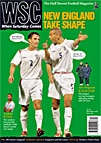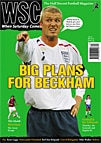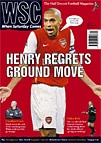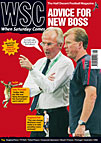 Dear WSC
Dear WSC
The Scotland supporters who found themselves under attack by a group of Ukraine fans on the evening prior to the recent Euro 2008 qualifier in Kiev have been praised for not retaliating but dispersing in as orderly a way as possible to avoid any escalation of the incident. Some Scots weren’t that lucky, however, about a dozen requiring hospital treatment for cuts, bruises and broken bones after the unprovoked assault by around 100 young Ukrainians in the city’s Independence Square. During the last 15 years or so, the self-styled Tartan Army has become legendary the world over for its self-deprecating humour and ability to make friends even in the most hostile of environments, as well as for swelling the coffers of local bar owners while simultaneously emptying towns and cities of supplies of beer and spirits. But in the wake of the Kiev incident, a small number of Scotland fans started to question whether being the touchy-feely, super furry animals of world football may have its downside. Indeed, it provoked an almost philosophical debate amongst Scotland fans on the streets of Kiev and later on internet forums; what would you do if we were attacked? Most who took part in this impromptu debate quite rightly condemned all violence and pointed out that Scotland fans’ hard-won reputation was at risk by even raising the spectre of the Tartan Army fighting back. A small minority put forward the thesis that Scotland have become too nice and that this translates – both on and off the field – as a soft touch. This in turn could invite trouble from determined hooligans who would attack safe in the knowledge that the Scots were unlikely to fight back. It’s unlikely, however, that this isolated event – even more shocking because it was just that – will give rise to a surge of disorder among Scots fans. Our sense of humour is unique (I still almost die laughing every time I hear people from Scotland complaining about terrible food on away trips) and can usually be relied on to defuse the odd potentially incendiary moment.In any case, which member of the Tartan Army is seriously going to risk not being able to attend the next World Cup we qualify for? (In the words of BA Robertson’s 1982 Scotland World Cup song, I Have a Dream.)
Colin McPherson, via email
Read more…
 In Argentina, football and politics were already linked before the banners appeared proclaiming “Las Malvinas son Argentinas”. Rodrigo Orihuela explains how the sport operated under the military regime
In Argentina, football and politics were already linked before the banners appeared proclaiming “Las Malvinas son Argentinas”. Rodrigo Orihuela explains how the sport operated under the military regime

